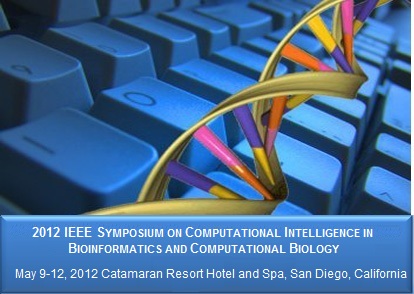Tutorials:

- Title: Molecular Biology for Computational Scientists, A Tutorial Introduction
Abstract: This tutorial introduces molecular biology for computational scientists that are tangentially familiar with or unfamiliar with it. The tutorial will cover molecular biology with an emphasis on data types, data sources, and potential applications for computational intelligence. Biological topics covered include the central dogma of molecular biology, the genetic code, protein and RNA structure, and sequence annotation. The tutorial will include pointers to both biological data sets and the CI literature on bioinformatics. A series of examples of applications of computational intelligence techniques with both the representational structure and application domain will form a part of the presentation.
Presenter: Wendy Ashlock has done work in genetic programming, the theory of evolutionary computation, the application of evolutionary computation to game theory and to modeling, and in bioinformatics. She has published papers and presented tutorials at both the IEEE CEC and CIBCB conferences. She has degrees in mathematics from the University of Chicago and the University of Guelph, and is currently working on a PhD in computer science at York University in Toronto, Canada.
- Title: A Survey of Representations For Bioinformatics and Computational Biology
Abstract: Representation is a central issue in evolutionary computation. The no free lunch theorem proves that there is no intrinsic advantage in a particular algorithm when considered against complete spaces of problems. The corollary is that algorithms should be fitted to the problems they are solving. Choice of representation is the point, in the design of an evolutionary algorithm, where the designer has the greatest influence over the adaptive landscape and behavior of the algorithm. That suggests that a large library of representations should be a part of the tool-kit of any evolutionary computation researcher.
This survey will cover a broad variety of representations with comments on their application in bioinformatics and computational biology. The representations covered include
- * Several representations in genetic programing.
- * State conditioned genetic programming.
- * The Sierpinski representation for model parameter estimation.
- * Representations for searching spaces of networks.
- * Hybrid representations.
Treatment of individual topics will be brief but a bibliography with pointers into the literature will be included and presentation of representations will be example driven.
Presenter: Professor Ashlock has been working in evolutionary computation since 1992. His work includes applications of evolutionary computation, to bioinformatics, ecological modeling, and theoretical biology. His principle focus is the invention of new representations that can be designed to make evolution solve problems efficiently. Dr. Ashlock earned a Doctorate in Mathematics at Caltech. He currently holds the Bioinformatics Chair in the Department of Mathematics and Statistics at the University of Guelph. He has been a member of faculties of pure and applied mathematics, mathematics education, bioinformatics, ecology and evolutionary biology, and human-computer interface.
- Title: Lab Techniques and Biological Data for Computational Scientists
Abstract: The primary goal of this tutorial is to enable computational scientists to be intelligent consumers of biological data. This tutorial will introduce a range of modern experimental biology techniques, the questions each is used to answer, data that results from these techniques and typical analysis tools. In this manner we will discuss the steps from cell culture to sample preparation to data collection. We will talk about issues of noise, repeatability and replicate data. A general understanding of basic biological principles is assumed on the part of the participants. Attendees should gain an appreciation of what is involved in collecting these types of data. A preliminary list of techniques to covered includes: electrophoresis, blotting & hybridization (northern, western, southern, EMSA etc), PCR, DNA arrays, next-‐gen sequencing arrays, immunoprecipitation, FACS, HPLC, microscopy techniques (confocal, FRET, FISH etc.), spectrophotometry, mass spectometry, electrophysiology and more.
Presenter: Dr. Kiehl is a Computing Innovation Fellow working in the NanoBioScience Constellation at the College of Nanoscale Science and Engineering. Previously Dr. Kiehl spent time as a postdoctoral fellow at Albany Medical College in their Center for Immunology and Microbial Disease. Dr. Kiehl completed his Ph.D. in Multidisciplinary Science at Rensselaer Polytechnic Institute and holds B.S. and M.S. degrees in Computer Science from Rensselaer. Prior to his return to university for doctoral studies, Dr. Kiehl worked in the Computational Intelligence Lab at GE Global Research in Niskayuna for 10 years. Dr. Kiehl is currently pursuing experimental and computational projects in computational neuroscience, evolutionary design of bio-‐active nano-‐scale systems and pattern/rule deduction in biological datasets.
- Title: A Survey of Representations For Bioinformatics and Computational Biology




